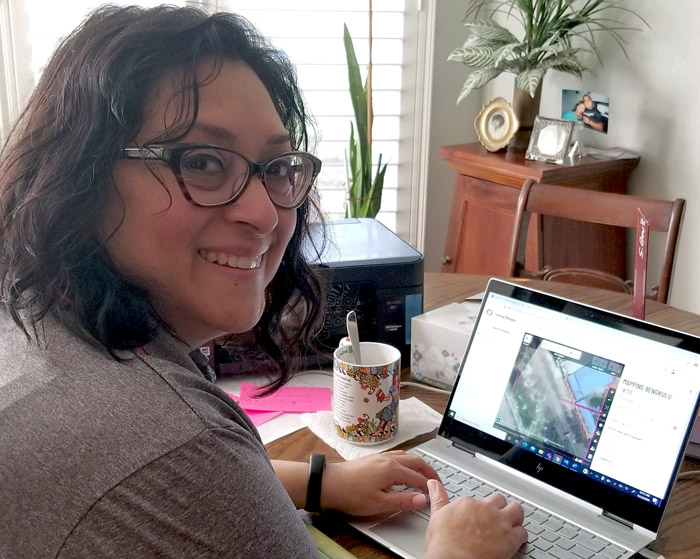Virtual Day of Service Helps Comets Reconnect
By: Robin Russell | Nov. 2, 2020
For Zainab Khan, a finance junior at The University of Texas at Dallas, the all-virtual Viva Volunteer day of service was not only an opportunity to support nonprofit organizations, but it also helped Comets studying remotely this semester reconnect with one another.

Khan was part of a team of 34 students who prepared 68 short creative videos for the organization Senior Source to encourage seniors currently in isolation and the staff members who care for them.
“It was really enjoyable for students to do something to help brighten the day for these seniors, and it was great for the students to ‘see’ one another after such a long time. We found it very relaxing to spend a few hours working on a project together,” Khan said.
Khan was among the more than 350 UT Dallas students who worked together on a single day to perform virtual service projects for nonprofit organizations. Organized by the Office of Student Volunteerism (OSV), Viva Volunteer participants from 21 student organizations and scholarship groups invested in a day of service for 18 agencies. The project coincided with the national Make a Difference Day on Oct. 24.
It was the first all-virtual Viva Volunteer event, and the participants’ combined 1,050 hours of donated labor saved nonprofit organizations more than $28,500. Their efforts extended beyond the Dallas area this year.

“One of the benefits of serving virtually is that we not only helped local agencies but also were able to support national organizations across the country,” said Anne Hart, OSV program coordinator. “These nonprofit groups still need volunteer help, even when they’re ‘closed’ during a pandemic.”
The volunteers’ socially distanced tasks included writing 135 thank-you cards for donors to the UT Dallas Comet Cupboard, supporting the Human Voicebank Initiative by recording sentences and phrases to help give voice to individuals with speaking disabilities, creating spreadsheets for plants and designing seed packet artwork for Texas Discovery Gardens, and serving the national project Missing Maps by helping to map roads and buildings in places where disasters have occurred.
Volunteers also tapped into multiple online projects on Zooniverse, a citizen-research web portal. Students helped Wildwatch Kenya count, identify and track 2,885 animals living in field conservation sites and supported American WWI Burial Cards by transcribing from registry cards the names, nature of death and burial locations for 400 deceased American soldiers from World War I.

Wendi Kavanaugh, assistant director of UT Dallas’ National Merit Scholars Program, was a staff leader for 18 students supporting Fishing in the Past, a Zooniverse project that identifies fish species on paintings from the 1500s to 1700s to gain information on biodiversity and commercial use of fish species.
“We had student volunteers spread out all over the U.S., from New Jersey to California, and we used Microsoft Teams to break them into groups. One of our Viva Volunteer goals is to have our scholars meet at least one new scholar, and the ‘breakout’ rooms allowed for that to happen naturally,” Kavanaugh said.
Biology senior Minh Truc Nguyen Luong was a site leader who worked with 25 other students on a Zooniverse project called Every Name Counts. The volunteers helped archive the names of those who suffered and died during Nazi persecution.
Luong said the project benefited students as much as the organization.
“It was very eye-opening, and we felt very grateful for having this experience,” Luong said. “Many students said they felt humbled. Our online chat was going the whole time because students found the stories so interesting. It was definitely an educational and enlightening experience.”
Media Contact:
Robin Russell, UT Dallas, 972-883-4431, robin.russell@utdallas.edu, or the Office of Media Relations, UT Dallas, (972) 883-2155, newscenter@utdallas.edu.





